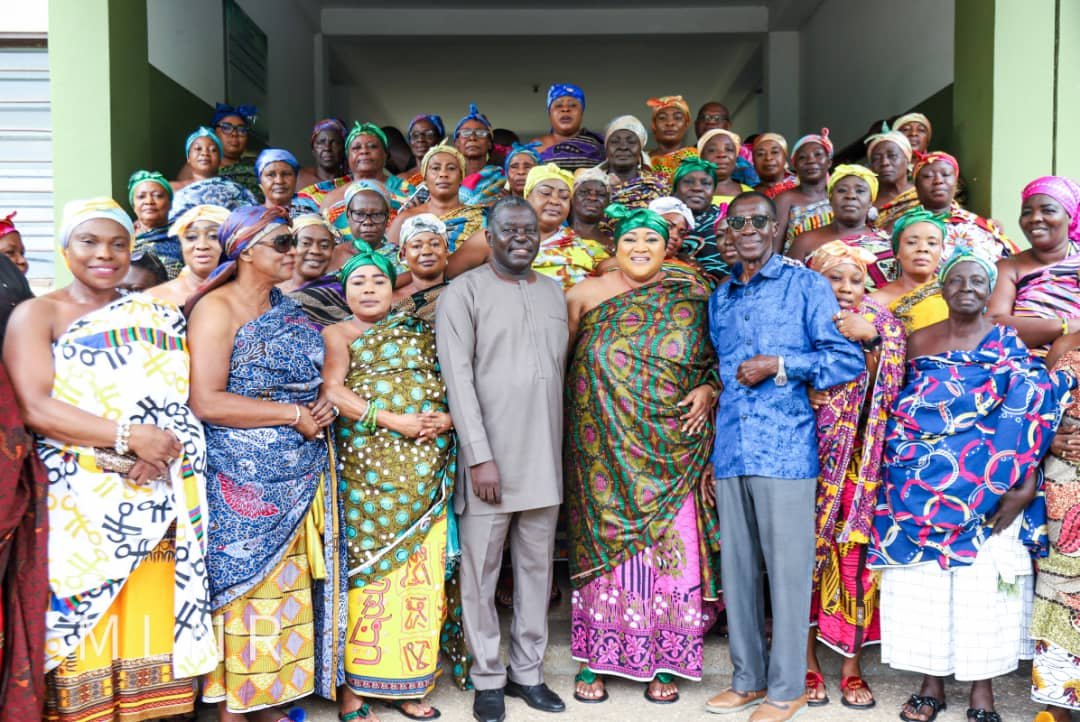
Benito Owusu-Bio, Deputy Lands Minister, flanked by the Asanteman Queen mothers at the workshop.

The Ministry of Lands and Natural Resources, in collaboration with the Forest Plantation Fund Board, is seeking to establish a 1,000-hectare bamboo and rattan plantation this year in the Ashanti Region, as part of activities to observe this year’s Green Ghana Day.
It is part of efforts to restore the country’s degraded landscapes, and contribute to global efforts to fight global warming.
The Ministry wants the bamboo and rattan plantation project to be spearheaded by queen mothers in Ashanti Region, who have been called upon to actively participate in this year’s Green Ghana Day.
In line with this agenda, a two-day sensitization workshop has been held for Asanteman Queen Mothers on ‘Bamboo and Rattan Plantation Development’.
This workshop follows a recent visit by the Minister of Lands and Natural Resources, Samuel Abu Jinapor, to the Ashanti Region to court the support of queen mothers for the fight against illegal small-scale mining, and for the bamboo plantation project.
Addressing the queen mothers at the workshop in Kumasi yesterday, Benito Owusu-Bio, Deputy Minister of Lands and Natural Resources responsible for Lands and Forestry, explained the importance of the bamboo and rattan plantation project to the government.
Potential
He stressed that Akufo-Addo administration recognises the potential of bamboo and rattan resources in “improving the livelihoods of hundreds of people that live near forest ecosystems, combating climate change and addressing the challenges of deforestation and forest degradation in Ghana”.
Mr Owusu-Bio further explained that the workshop, among other things, would provide the queen mothers with good knowledge and insight on the extent to which bamboo and rattan resources in Ghana can sustain the livelihoods of communities, and their job creation opportunities that exist, especially, for women and the youth.
He also indicated that the outcome of the workshop would be very critical, stressing that “it will increase the number of stakeholders engaged in government efforts to meet the planting targets in the country’s Forest Plantation Strategy”.
This strategy, he noted, seeks to establish over 500,000 hectares of new bamboo plantations between 2015 -2040.
Assurance
The Deputy Minister told the queen mothers that the maiden sensitization programme was just a pilot, revealing that the Ministry would mobilise additional resources to ensure that the programme reaches other regions in order to maximise the benefits of the bamboo industry.
“I wish to assure you of the unflinching support of my Minister and the Ministry of Lands and Natural Resources to support this initiative. We will do our maximum best to provide the necessary technical and logistical support to promote this bamboo plantation development enterprise,” he said.
Reforestation
Mr Owusu-Bio relished the opportunity to encourage all queen mothers in the country to support the government’s agenda in the fight against deforestation and forest degradation.
He particularly charged them to support the fight against galamsey, which had destroyed the country’s major wetlands.
He emphasised that the fight is not for only government institutions, but a collective responsibility from all.
He also urged the Forestry Commission, the Director of International Association of Bamboo and Rattan Development (INBAR) and the Plantation Fund Board to continue to support the programme.
The Deputy Minister illustrated some unique benefits of bamboo, saying bamboo serves as a unique ingredient in job creation along the value-chain, and provides alternative livelihoods.
He added that it is suitable for reclaiming degraded lands and conserving watersheds.
Other benefits, he noted, is the fact that it meets the country’s huge demand for wood fuel, handicrafts, furniture, materials for housing as well as mitigating climate change.
Collaboration
The Board Chairman of the Forestry Plantation Fund Board and Chief of Chiraa Traditional Area, Nana Osei Yaw Barima, promised a collaborative and smooth partnership with the queen mothers to ensure that the bamboo project becomes a resounding success.
Joseph Osiakwan, the Technical Director for Forestry at the Ministry, expressed the hope that the workshop would help the queen mothers have in-depth knowledge on how to plant bamboo, cultivate it and make relevant products, which have commercial value from the bamboo plant.
Appreciation
For her part, the queen mother of the Mampong Traditional Area, Nana Agyakuma Difie, who chaired the event, expressed appreciation to the sector Minister and the Plantation Fund Board for keeping to their word, and making such an important project possible for them.
“I see as a dream come true. I am most grateful to the Minister and his Deputy for the recognition of the Queen mothers as a major stakeholder in this area of bamboo enterprise development,” she stated.
The Mamponghemaa charged the queen mothers to see this opportunity as a responsibility to their children and generations to come, saying it will help contribute to reduction in global warming, and also contribute to government’s re-afforestation agenda.
She stressed that the bamboo project is not only for the Asanteman Queen Mothers, but for all queen mothers and women in traditional authorities across country.





